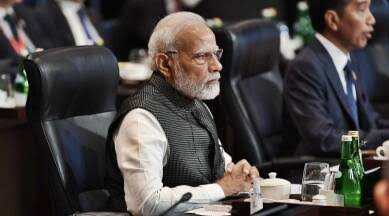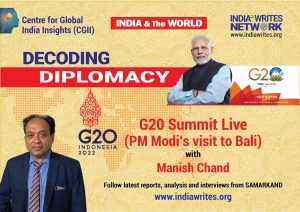
BALI: In a mark of New Delhi’s growing global stature and soft power, India played a pivotal role in rescuing the G20 summit of the world’s most powerful countries in Bali by midwifing a consensus on acceptable language in the planned joint communique on the Ukraine crisis, and playing the role of a bridge builder between rival parties.
Amid speculation about the collapse of the Bali summit due to the reported failure to come out with a joint communique, India, along with Indonesia, played the role of swing states by accommodating dissenting viewpoints on the Ukraine crisis in a mutually agreed joint statement, highly-placed sources told this writer on the margins of the G20 summit. Just when there was a sense of resignation in the international community about the Bali summit ending without a joint declaration, India’s adroit negotiators pulled off the nearly impossible by getting Russia and Western countries to agree to a consensus formulation on the Ukraine crisis.
The mutually agreed language on the Ukraine crisis does not explicitly condemn Russia, but highlights the threat of a nuclear conflagration, a veiled but obvious reference to Russia’s oft-iterated threat of using nuclear weapons to end the Ukraine crisis. The joint communique recognises alternate viewpoints, including Moscow’s security concerns, but refrains from adversarial confrontationist posturing, thereby saving the G20 from partisan duelling.
India played a constructive and positive role in promoting a mid-way inclusive formulation on the Ukraine crisis, thereby setting the stage for the success of India’s first-ever presidency of G20 that begins on December 1, 2022. Prime Minister’s much-quoted advice to Russian President Vladimir Putin in Samarkand – “this is not the age of war — has also been included in the G20 Bali declaration, said well-placed sources.
Both Indonesia and India, the current and future chair of the G20 respectively, argued before sceptics and dissenters that a joint communique and a mutually agreeable formulation on the Ukraine crisis was essential to saving the grouping. Indonesia’s behind-the-scenes diplomacy also played a pivotal role in salvaging the Bali summit from the ignominy of ending without a joint statement. However, sources cautioned that one should wait for the Bali Declaration on November 16 as there could be many a slip between the cup and the lips.
Indonesian President Joko Widodo will symbolically hand over the G2O presidency to India at the end of the Bali summit on November 16. This is the first time developing and emerging economies, including Indonesia, India, Brazil and South Africa will hold the presidency of G20 from 2022 to 2025.
Diplomacy & Dialogue
Speaking at the G20 summit, PM Modi underlined the need for diplomacy and dialogue to resolve the Ukraine crisis. “I have repeatedly said that we have to find a way to return to the path of ceasefire and diplomacy in Ukraine.”

“The onus of creating a new world order for the post-Covid period lies on our shoulders. The need of the hour is to show concrete and collective resolve to ensure peace, harmony and security in the world,” he said. Setting the tone for India’s G20 presidency, PM Modi said: “I am confident that next year when the G20 meets in the holy land of Buddha and Gandhi, we will all agree to convey a strong message of peace to the world.”
In a bow to Indonesia, PM Modi “heartily congratulated” President Joko Widodo for “giving effective leadership to the G-20 in a challenging global environment.” “Climate change, the Covid pandemic, the developments in Ukraine, and the global problems associated with it. All these together have caused havoc in the world. Global supply chains are in ruins. There is a crisis of essentials, essential goods all over the world,” he said.
PM Modi also made a powerful pitch for reform of global governance institutions to address the challenges faced by the global South. “Due to the double whammy, they lack the financial capacity to handle it. We should also not hesitate to acknowledge that multilateral institutions such as the UN have been unsuccessful on these issues. And we have all failed to make suitable reforms in them.” “Therefore, today the world has greater expectations from the G-20, the relevance of our group has become more significant.”
In a subtle defence of India’s continuing purchase of Russian oil, PM Modi highlighted that “India’s energy-security is also important for global growth, as it is the world’s fastest growing economy.” “We must not promote any restrictions on the supply of energy and stability in the energy market should be ensured,” he said.
Underlining India’s commitment to green growth, PM said: “India is committed to clean energy and environment. By 2030, half of our electricity will be generated from renewable sources.”
Outlining a key priority for India’s G20 presidency, PM Modi stressed that “time-bound and affordable finance and sustainable supply of technology to developing countries is essential for inclusive energy transition.”

(Manish Chand is CEO-Editor-in-Chief, India Writes Network, and India and The World magazine. He is Director, Centre for Global Insights India, a think tank focused on global affairs. He is in Bali to report on and anlyse the G20 summit)
Author Profile

- Manish Chand is Founder and Editor-in-Chief of India Writes Network (www.indiawrites.org) and India and World, a pioneering magazine focused on international affairs. He is CEO, Centre for Global India Insights, an India-based think tank focused on global affairs.
Latest entries
 India and the WorldFebruary 27, 2026Modi visit: India-Israel partnership enters a new era
India and the WorldFebruary 27, 2026Modi visit: India-Israel partnership enters a new era India and the WorldFebruary 24, 2026Unravelling Modi’s Israel journey: What to expect
India and the WorldFebruary 24, 2026Unravelling Modi’s Israel journey: What to expect India and the WorldFebruary 17, 2026South-by-South: Focus on people-centric solutions at India AI summit
India and the WorldFebruary 17, 2026South-by-South: Focus on people-centric solutions at India AI summit India and the WorldFebruary 7, 2026Modi hails interim India-US trade deal, Goyal says no concessions made on agriculture
India and the WorldFebruary 7, 2026Modi hails interim India-US trade deal, Goyal says no concessions made on agriculture







